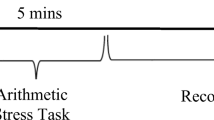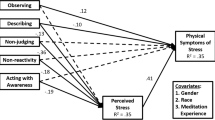Abstract
Objectives
Mindfulness stress buffering theory (Creswell & Lindsay, 2014) posits that higher dispositional (trait) mindfulness can protect cardiovascular health by buffering physiological stress reactivity — a risk marker for hypertension and cardiac events. Yet, empirical evidence is mixed. This study used baseline data from the Serenity Study — a recently completed, two-site randomized clinical trial — to assess the link between trait mindfulness and cardiovascular stress reactivity in adults with unmedicated prehypertension (n = 153, Mage = 50, 47% male, 69% White, 28% African-American).
Methods
Latent growth curve modeling was used to determine whether specific facets of trait mindfulness, measured by the Five Facet Mindfulness Questionnaire and the Decentering subscale of the Experiences Questionnaire, predict blood pressure (BP) and heart rate (HR) responses to a brief laboratory stressor (5-min anger recall task). BP and HR taken 1-min apart were used in latent growth curve models. We hypothesized after controlling for known covariates of cardiovascular health, higher trait mindfulness would predict lower cardiovascular reactivity to, and faster recovery from, acute emotional stress.
Results
Contrary to predictions, no mindfulness facets predicted cardiovascular reactivity or recovery.
Conclusions
These findings indicate that trait mindfulness facets may not independently affect BP and HR responses to acute emotional stress among prehypertensive but otherwise healthy adults with normal stress levels, prior to mindfulness training. Mindfulness-based interventions may therefore be necessary to engender benefits of mindfulness on stress physiology, as a putative biological mechanism of cardiovascular risk reduction and health promotion.
Trial registration number and date of registration: NCT02371317, 1/21/2015


Similar content being viewed by others
Data Availability
Please contact the corresponding author, Jeffrey Greeson, Ph.D. for inquiries regarding the datasets related to this article.
References
Baer, R. (2019). Assessment of mindfulness by self-report. Current Opinion in Psychology, 28, 42–48. https://doi.org/10.1016/j.copsyc.2018.10.015
Baer, R. A., Smith, G. T., Hopkins, J., Krietemeyer, J., & Toney, L. (2006). Using self-report assessment methods to explore facets of mindfulness. Assessment, 13(1), 27–45. https://doi.org/10.1177/1073191105283504
Benjamin, E. J., Muntner, P., Alonso, A., Bittencourt, M. S., Callaway, C. W., Carson, A. P., Chamberlain, A. M., Chang, A. R., Cheng, S., Das, S. R., Delling, F. N., Djousse, L., Elkind, M., Ferguson, J. F., Fornage, M., Jordan, L. C., Khan, S. S., Kissela, B. M., Knutson, K. L., American Heart Association Council on Epidemiology and Prevention Statistics Committee and Stroke Statistics Subcommittee. (2019). Heart Disease and Stroke Statistics-2019 Update: A report from the American Heart Association. Circulation, 139(10), e56–e528. https://doi.org/10.1161/CIR.0000000000000659
Brzozowski, A., Gillespie, S. M., Dixon, L., & Mitchell, I. J. (2018). Mindfulness dampens cardiac responses to motion scenes of violence. Mindfulness, 9(2), 575–584. https://doi.org/10.1007/s12671-017-0799-6
Bullis, J. R., Bøe, H. J., Asnaani, A., & Hofmann, S. G. (2014). The benefits of being mindful: Trait mindfulness predicts less stress reactivity to suppression. Journal of Behavior Therapy and Experimental Psychiatry, 45(1), 57–66. https://doi.org/10.1016/j.jbtep.2013.07.006
Cangur, S., & Ercan, I. (2015). Comparison of model fit indices used in structural equation modeling under multivariate normality. Journal of Modern Applied Statistical Methods, 4(1), 14. https://doi.org/10.22237/jmasm/1430453580
Chambers, R., Gullone, E., & Allen, N. B. (2009). Mindful emotion regulation: An integrative review. Clinical Psychology Review, 29(6), 560–572. https://doi.org/10.1016/j.cpr.2009.06.005
Chida, Y., & Steptoe, A. (2010). Greater cardiovascular responses to laboratory mental stress are associated with poor subsequent cardiovascular risk status: A meta-analysis of prospective evidence. Hypertension, 55(4), 1026–1032. https://doi.org/10.1161/HYPERTENSIONAHA.109.146621
Chobanian, A. V., Bakris, G. L., Black, H. R., Cushman, W. C., Green, L. A., Izzo, J. L., Jr., Jones, D. W., Materson, B. J., Oparil, S., Wright, J. T., Jr., Roccella, E. J., Committee, J. N., & on Prevention, Detection, Evaluation, and Treatment of High Blood Pressure. National Heart, Lung, and Blood Institute, & National High Blood Pressure Education Program Coordinating Committee. (2003). Seventh report of the Joint National Committee on Prevention, Detection, Evaluation, and Treatment of High Blood Pressure. Hypertension, 42(6), 1206–1252. https://doi.org/10.1161/01.HYP.0000107251.49515.c2
Cohen, S., & Janicki-Deverts, D. (2012). Who’s stressed? Distributions of psychological stress in the United States in probability samples from 1983, 2006, and 2009. Journal of Applied Social Psychology, 42(6), 1320–1334. https://doi.org/10.1111/j.1559-1816.2012.00900.x
Creswell, J. D., & Lindsay, E. K. (2014). How does mindfulness training affect health? A mindfulness stress buffering account. Current Directions in Psychological Science, 23(6), 401–407. https://doi.org/10.1177/0963721414547415
Ede, D. E., Walter, F. A., & Hughes, J. W. (2020). Exploring how trait mindfulness relates to perceived stress and cardiovascular reactivity. International Journal of Behavioral Medicine, 27(4), 415–425. https://doi.org/10.1007/s12529-020-09871-y
Fresco, D. M., Moore, M. T., van Dulmen, M. H., Segal, Z. V., Ma, S. H., Teasdale, J. D., & Williams, J. M. (2007). Initial psychometric properties of the experiences questionnaire: Validation of a self-report measure of decentering. Behavior Therapy, 38(3), 234–246. https://doi.org/10.1016/j.beth.2006.08.003
Goldberg, S. B., Wielgosz, J., Dahl, C., Schuyler, B., MacCoon, D. S., Rosenkranz, M., Lutz, A., Sebranek, C. A., & Davidson, R. J. (2016). Does the Five Facet Mindfulness Questionnaire measure what we think it does? Construct validity evidence from an active controlled randomized clinical trial. Psychological Assessment, 28(8), 1009–1014. https://doi.org/10.1037/pas0000233
Greeson, J., Garland, E. L., & Black, D. (2014). Mindfulness: A transtherapeutic approach for transdiagnostic mental processes. In A. le, C. T. Ngnoumen, & E. J. Langer (Eds.), The Wiley Blackwell Handbook of Mindfulness (pp. 533–562). Wiley Blackwell. https://doi.org/10.1002/9781118294895.ch28
Grossman, P. (2008). On measuring mindfulness in psychosomatic and psychological research. Journal of Psychosomatic Research, 64(4), 405–408. https://doi.org/10.1016/j.jpsychores.2008.02.001
Guendelman, S., Medeiros, S., & Rampes, H. (2017). Mindfulness and emotion regulation: Insights from neurobiological, psychological, and clinical studies. Frontiers in Psychology, 8, 220. https://doi.org/10.3389/fpsyg.2017.00220
Holland, B. S., & Copenhaver, M. D. (1988). Improved Bonferroni-type multiple testing procedures. Psychological Bulletin, 104(1), 145–149. https://doi.org/10.1037/0033-2909.104.1.145
Hughes, J. W., Fresco, D. M., Myerscough, R., van Dulmen, M. H., Carlson, L. E., & Josephson, R. (2013). Randomized controlled trial of mindfulness-based stress reduction for prehypertension. Psychosomatic Medicine, 75(8), 721–728. https://doi.org/10.1097/PSY.0b013e3182a3e4e5
Kabat-Zinn, J. (1994). Wherever you go, there you are: Mindfulness meditation in everyday life. Hyperion.
Kiken, L. G., Garland, E. L., Bluth, K., Palsson, O. S., & Gaylord, S. A. (2015). From a state to a trait: Trajectories of state mindfulness in meditation during intervention predict changes in trait mindfulness. Personality and Individual Differences, 81, 41–46. https://doi.org/10.1016/j.paid.2014.12.044
Kimmes, J. G., May, R. W., Seibert, G. S., Jaurequi, M. E., & Fincham, F. D. (2018). The association between trait mindfulness and cardiovascular reactivity during marital conflict. Mindfulness, 9(4), 1160–1169. https://doi.org/10.1007/s12671-017-0853-4
Kolenikov, S., & Bollen, K. A. (2012). Testing negative error variances: Is a Heywood case a symptom of misspecification? Sociological Methods & Research, 41(1), 124–167. https://doi.org/10.1177/0049124112442138
Larsen, B. A., & Christenfeld, N. J. (2009). Cardiovascular disease and psychiatric comorbidity: The potential role of perseverative cognition. Cardiovascular Psychiatry and Neurology, Article 791017. https://doi.org/10.1155/2009/791017
Levinson, D. B., Stoll, E. L., Kindy, S. D., Merry, H. L., & Davidson, R. J. (2014). A mind you can count on: Validating breath counting as a behavioral measure of mindfulness. Frontiers in Psychology, 5, 1202. https://doi.org/10.3389/fpsyg.2014.01202
Lindsay, E. K., & Creswell, J. D. (2017). Mechanisms of mindfulness training: Monitor and Acceptance Theory (MAT). Clinical Psychology Review, 51, 48–59. https://doi.org/10.1016/j.cpr.2016.10.011
Loucks, E. B., Schuman-Olivier, Z., Britton, W. B., Fresco, D. M., Desbordes, G., Brewer, J. A., & Fulwiler, C. (2015). Mindfulness and cardiovascular disease risk: State of the evidence, plausible mechanisms, and theoretical framework. Current Cardiology Reports, 17(12), 112. https://doi.org/10.1007/s11886-015-0668-7
McEwen, B. S. (2000). The neurobiology of stress: From serendipity to clinical relevance. Brain Research, 886(1–2), 172–189. https://doi.org/10.1016/s0006-8993(00)02950-4
Nyklíček, I., Mommersteeg, P. M., Van Beugen, S., Ramakers, C., & Van Boxtel, G. J. (2013). Mindfulness-based stress reduction and physiological activity during acute stress: A randomized controlled trial. Health Psychology, 32(10), 1110–1113. https://doi.org/10.1037/a0032200
Pickering, T. G., Hall, J. E., Appel, L. J., Falkner, B. E., Graves, J., Hill, M. N., Jones, D. W., Kurtz, T., Sheps, S. G., & Roccella, E. J. (2005). Recommendations for blood pressure measurement in humans and experimental animals: Part 1: Blood pressure measurement in humans: A statement for professionals from the Subcommittee of Professional and Public Education of the American Heart Association Council on High Blood Pressure Research. Circulation, 111(5), 697–716. https://doi.org/10.1161/01.CIR.0000154900.76284.F6
Schwartz, A. R., Gerin, W., Christenfeld, N., Glynn, L., Davidson, K., & Pickering, T. G. (2000, August). Effects of an anger-recall task on poststress rumination and blood pressure recovery in men and women. Psychophysiology, 37 (Suppl. 1), S12-S13.
Shapiro, S. L., & Carlson, L. E. (2009). The art and science of mindfulness: Integrating mindfulness into psychology and the helping professions. American Psychological Association. https://doi.org/10.1037/11885-000
Steffen, P. R., & Larson, M. J. (2015). A brief mindfulness exercise reduces cardiovascular reactivity during a laboratory stressor paradigm. Mindfulness, 6(4), 803–811. https://doi.org/10.1007/s12671-014-0320-4
Van Dam, N. T., van Vugt, M. K., Vago, D. R., Schmalzl, L., Saron, C. D., Olendzki, A., Meissner, T., Lazar, S. W., Kerr, C. E., Gorchov, J., Fox, K. C. R., Field, B. A., Britton, W. B., Brefczynski-Lewis, J. A., & Meyer, D. E. (2018). Mind the hype: A critical evaluation and prescriptive agenda for research on mindfulness and meditation. Perspectives on Psychological Science, 13(1), 36–61. https://doi.org/10.1177/1745691617709589
Waked, E. G., & Jutai, J. W. (1990). Baseline and reactivity measures of blood pressure and negative affect in borderline hypertension. Physiology & Behavior, 47(2), 265–271. https://doi.org/10.1016/0031-9384(90)90141-p
Waldron, E. M., Hong, S., Moskowitz, J. T., & Burnett-Zeigler, I. (2018). A systematic review of the demographic characteristics of participants in US-based randomized controlled trials of mindfulness-based interventions. Mindfulness, 9(6), 1671–1692. https://doi.org/10.1007/s12671-018-0920-5
Williams, M. J., Dalgleish, T., Karl, A., & Kuyken, W. (2014). Examining the factor structures of the five facet mindfulness questionnaire and the self-compassion scale. Psychological Assessment, 26(2), 407–418. https://doi.org/10.1037/a0035566
Zeidan, F., Johnson, S. K., Gordon, N. S., & Goolkasian, P. (2010). Effects of brief and sham mindfulness meditation on mood and cardiovascular variables. Journal of Alternative and Complementary Medicine, 16(8), 867–873. https://doi.org/10.1089/acm.2009.0321
Acknowledgements
We acknowledge Vanessa Anyanso, Jonathan Reda, Mary Keenan, Devin Barney, Megan Strowger, Rosa Heryak, and Monica Fallon for their assistance with data collection. We acknowledge Kora Clauser for her editorial assistance. We thank Drs. Dustin Fife, Georita Frierson, and Steven Brunwasser for advising on data analysis and interpretation of results.
Funding
This study was funded by the National Institutes of Health, National Heart, Lung, and Blood Institute (R01 HL119977) and by an associated Diversity Supplement Award (R01 HL119977-04S1). Its contents are solely the responsibility of the authors and do not necessarily represent the official views of the National Institutes of Health.
Author information
Authors and Affiliations
Contributions
GC: Collaborated with the conceptualization of the current data analyses, completed the current data analyses, and wrote the manuscript. JG: Collaborated with the design and execution of the study, and collaborated with the conceptualization of the current data analyses and writing the manuscript. JH: Collaborated with the design and execution of the study, critically reviewed the manuscript for intellectual content. DF: Collaborated with the design and execution of the study, critically reviewed the manuscript for intellectual content.
Corresponding author
Ethics declarations
Ethics Approval Consent to Participate
The study was approved by the institutional review boards of Kent State University and the University of Pennsylvania. The procedures used in this study adhere to the tenets of the Declaration of Helsinki. Written informed consent was obtained from all individual participants included in the study.
Conflict of Interest
The authors declare no competing interests.
Additional information
Publisher's Note
Springer Nature remains neutral with regard to jurisdictional claims in published maps and institutional affiliations.
Supplementary Information
Below is the link to the electronic supplementary material.
Rights and permissions
About this article
Cite this article
Chin, G.R., Greeson, J.M., Hughes, J.W. et al. Does Dispositional Mindfulness Predict Cardiovascular Reactivity to Emotional Stress in Prehypertension? Latent Growth Curve Analyses from the Serenity Study. Mindfulness 12, 2624–2634 (2021). https://doi.org/10.1007/s12671-021-01745-y
Accepted:
Published:
Issue Date:
DOI: https://doi.org/10.1007/s12671-021-01745-y




